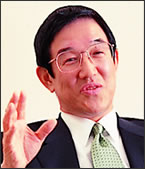
Born in 1939 in Mie Prefecture, Tsutomu Okuda passed his childhood in Isawamura Village, Iinan County, where his family lived during WWII due to the war-time evacuation from the cities. His father ran a brokerage house. After graduating from Tsu High School, he came to Tokyo and studied law at Keio University. Tokyo was then in the midst of a great transformation just before the Tokyo Olympic Games. After graduation, he joined Daimaru, Inc., which in those days enjoyed the highest sales among businesses in the distribution sector. The Japanese economy was experiencing high growth, and the distribution business was attracting widespread attention. At Daimaru Kyoto Store, his first workplace, he was assigned to the men's garment department. In 1975, Okuda had a chance to study at the Fashion Institute of Technology (FIT) in New York. After graduation from FIT he was trained at Bloomingdale's Department Store. This experience had a significant impact on his views about management.
American and European department stores emphasized market-orientation and standardization, and were completely different from what he had experienced in Japan. Strongly impressed by the integration of practice and post-graduate education at FIT, Okuda studied earnestly and was granted an honor prize from the institute on graduation.
After returning to Japan, Okuda was involved in establishing Daimaru Umeda Store. He succeeded in creating sales floors focused on specific concepts and produced favorable results, after overcoming a variety of unfavorable conditions. According to conventional wisdom, the location of the Daimaru Umeda Store was not advantageous, because it was between the Hankyu and Hanshin department stores, and its narrow selling floors were in a high-rise building.
Though the sales performance for the Umeda Store was not very good at the outset, consumer awareness of the new department store gradually increased, and within a few years the store had gained the support of many loyal customers. Recognized for his managerial ability and his overseas experience, he was assigned to the post of president and general manager of the Melbourne Store in Australia when it opened in 1991. Japan, in those days, was in the midst of the economic bubble and the strategy of overseas expansion by Japanese department stores was at its peak.
In Australia, where a department store directly bought the goods it sold, Okuda had to employ a business style completely different from that of Japan. This meant that the success of a department store greatly depended on the ability of buyers. Okuda had to solve many problems before the grand opening of the Melbourne Store, including the recruitment of buyers and the education and training of employees.
After overcoming those challenges, the Melbourne Store enjoyed considerable success. For Okuda, Australia was a very good place to live. However, he had to return to Japan when the Melbourne Store was still on the growth track.
At that time Daimaru was suffering a deep sales decline, and when Okuda took over the office of President in 1997, the department store was encumbered with many unprofitable business units. In order to improve the situation, Okuda took decisive action to comprehensively overhaul the department store by closing unprofitable stores and inviting employees to take early retirement. The three cases in this volume are closely related to the era when Okuda was President; and his decisions played important roles in all of them.
|